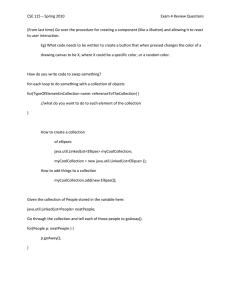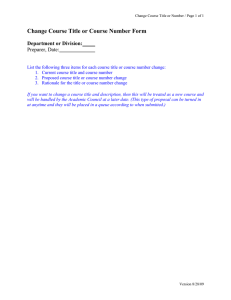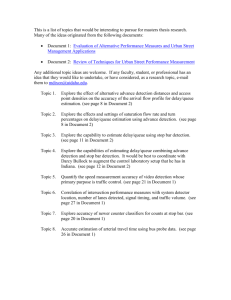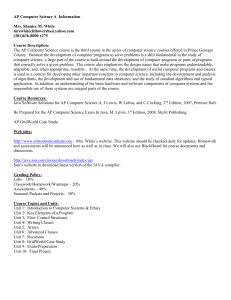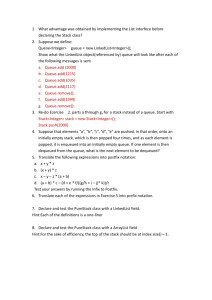CS112 Lab 02, Jan 28, 31 2010 , Diane H. Theriault
advertisement
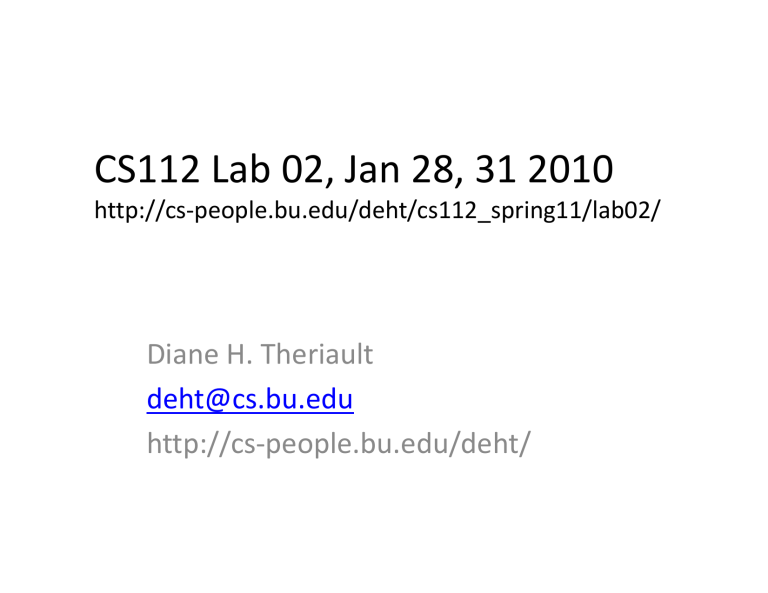
CS112 Lab 02,, Jan 28,, 31 2010
http://cs‐people.bu.edu/deht/cs112_spring11/lab02/
Diane H. Theriault
deht@cs.bu.edu
http://cs‐people.bu.edu/deht/
Today’ss Topics
Today
• Inheritance & Interfaces
• Collections
C ll i
and
d Iterators (Queue
(Q
in
i particular)
i l )
• Generics
References
•
http://download.oracle.com/javase/tutorial/java/IandI/index.html
(Inheritance & Interfaces)
•
•
http://download.oracle.com/javase/1.5.0/docs/api/java/util/Queue.html
http://download
oracle com/javase/1 5 0/docs/api/java/util/Queue html
http://download.oracle.com/javase/1.5.0/docs/api/java/util/LinkedList.html
(LinkedList and Queue API)
•
http://download.oracle.com/javase/tutorial/java/generics/index.html
Generics
Inheritance
• “is
is aa” relationship.
relationship
– A Motorcycle IS A Vehicle
– A Car IS A Vehicle
– A Ship IS A Vehicle
Motorcycle
Vehicle
Car
Ship
public class Vehicle { … }
public class Car extends Vehicle {…}
{ }
•
(BTW, Inheritance hierarchies can be a source of a lot of arguments in large code bases!)
Inheritance
• When a class extends a superclass, it inherits
all of the member variables and methods of
the parent class
• A subclass can override or change
g the
behavior of any of the methods of the
p
((This is called polymorphism)
p y
p
)
superclass.
• Everything in Java inherits from the “Object”
Object class.
class
Inheritance
• Assigning
g g Subclass to Superclass
p
reference is free.
Object myObject = new LinkedList();
• Assigning
A i i Superclass
S
l to
t Subclass
S b l mustt be
b done
d
carefully.
f ll
• Java checks for type compatibility at run‐time.
LinkedList myList = (LinkedList) myObject;
• Doing it incorrectly can cause exceptions (crashes)
Object myObject = new String(“hello”)
Vehicle myVehicle = (Vehicle) myObject;
//WRONG!
Inheritance
• An “abstract”
abstract class does not need to provide a
base implementation for all of its methods.
• The keyword “super” is used in subclasses to
i k the
invoke
h constructor off the
h parent ((possibly
ibl
with arguments)
Interface
• “acts
acts like a”
a relationship
– A Car acts like a transportation mechanism
– A Car acts like a bright shiny object
– A Car acts like a thing that needs maintenance
• A contract
t t tto provide
id certain
t i ffunctionality
ti
lit
public interface Drivable { public void steer(); }
public class Car extends Vehicle implements Drivable
{ …
public
bli void
id steer()
t () {…}
{ }
}
Inheritance vs Interfaces
• A “base
base class
class” or “superclass”
superclass can have many
“subclasses”
• In Java,, a subclass can onlyy extend one superclass.
p
• BUT, some objects can have many different types of
behavior (implement many different interfaces).
• (Interfaces can inherit from other interfaces, just like classes)
Example from Java Library
public class LinkedList<E>
extends AbstractSequentialList<E>
implements
p
List<E>,, Q
Queue<E>,, Cloneable,, Serializable
public interface Collection
Collection<E>
E
extends Iterable<E>
(We will explain the <E> notation in a bit)
Referencing Objects
• Can refer to an object using a reference of its type,
any of its parent
parent’ss types
types, or the type of any interface
it implements
Li k dLi t myList
LinkedList
Li t = new LinkedList();
Li k dLi t() //the
//th type
t
itself
it lf
Object myList = new LinkedList();
//everything in Java inherits from Object
Queue myList = new LinkedList();
//LinkedList implements the Queue interface
Drawable myList = new LinkedList();
//No! LinkedList does not implement Drawable!
How do you know?
• How do you know what class XXX inherits from?
• How do you know what interfaces it implements?
• The Java Doc!
http://download oracle com/javase/1 5 0/docs/api/
http://download.oracle.com/javase/1.5.0/docs/api/
Today’ss Topics
Today
• Inheritance & Interfaces
• Collections
C ll i
and
d Iterators (Queue
(Q
in
i particular)
i l )
• Generics
Collections
• “Collection”
Collection is a Java interface
interface.
• It is implemented by several classes
(ArrayList, LinkedList, TreeSet, etc.)
http://download.oracle.com/javase/1.5.0/docs/api/java/util/Collection.html
Methods include: add(), remove(), size(), etc.
Collections & Iterators
• Collections can be stored in many ways
(that we will learn about in CS112)
• Iterators provide a unified way to access the
elements
l
off a collection
ll i
• (The Collection interface extends the Iterable interface)
Why use Iterators?
• Why can
can’tt I just loop over a collection using
for(int i=0; i<myCollection.size(); i++)?
• This onlyy works for arrays!
y
– Not ArrayLists, LinkedLists, or any other type of
Collection.
• Even if it did work, there are many data structures
(like trees) where the notion of the “i’th” element is
not well‐defined
• Within a structure, indexes can change as you
manipulate the object.
Two ways to iterate over a Collection
• Just syntax.
syntax Semantically identical
identical.
ffor(Iterator
(It t iter=myList.iterator();
it
Li t it t () iter.hasNext();
it h N t() )
{
Object myObject = iter.next();
()
System.out.println(myObject);
}
//confusing! The next() call both retrieves the current
item in the collection and increments the iterator.
Two ways to iterate over a Collection
• Just syntax.
syntax Semantically identical
identical.
ffor(Object
(Obj t myObject:
Obj t myList)
Li t)
{
System.out.println(myObject);
(
)
}
//much better!
What is a Queue?
• First In,
In First Out (FIFO)
• First Come, First Serve (FCFS)
• Like being in line at the movies.
The Queue Interface
• Queue is just another Java interface
interface, which
happens to be implemented by LinkedList.
• It inherits from Collection
Collection.
Queue myQueue = new LinkedList();
myQueue.offer()
myQueue.peek()
myQueue poll() / myQueue.remove()
myQueue.poll()
myQueue remove()
http://download oracle com/javase/1 5 0/docs/api/java/util/Queue html
http://download.oracle.com/javase/1.5.0/docs/api/java/util/Queue.html
The Queue Interface
• What
What’ss with the weird names?
• Queues can fill up.
– Offer() can return false
– Add()
() can onlyy throw an exception
p
• Also, need to differentiate between the
queue‐like methods and the collection‐like
methods (which may not enforce ordering
correctly).
Today’ss Topics
Today
• Inheritance & Interfaces
• Collections
C ll i
and
d Iterators (Queue
(Q
in
i particular)
i l )
• Generics
Collections and Types
• Collections don
don’tt know what’s
what s in them.
them
• Type‐checking must be done at run‐time.
• Exceptions
i
and
d crashes
h may ensue.
LinkedList myList = new LinkedList();
myList add(new String(
myList.add(new
String(“hello”));
hello ));
for(Object myObject: myList)
{
Integer value
l = ((Integer)) myObject;
b
//
//exception!!
System.out.println(value);
}
Types and Generics
• Special “<<…>>” syntax allows you to promise
the type of objects that the Collection holds.
• This allows compile
compile‐time
time type‐checking.
type checking
LinkedList<String> myList = new LinkedList<String>();
myList.add(new String(“hello”));
for(String myObject: myList)
{
Integer value = (Integer) myObject; //compiler error!
System.out.println(value);
}
Practical Lab: DiscoveryChannel Party
• I have invited the casts of 3 Discovery Channel
series to my house for a party.
• Each cast will travel in their preferred vehicle
type
– Mythbusters
M thb t (C
(Car))
– Deadliest Catch (Ship)
– American Chopper
h
((Motorcycle)
l )
Practical Lab: DiscoveryChannel Party
• Motorcycle,
Motorcycle Car,
Car and Ship extend Vehicle
– Vehicle has Strings mName and mDriver
– Vehicle has abstract methods
• getManifest() // returns a list of Strings (passenger names)
• Go() //returns a string describing the action of the Vehicle
• Car and Ship implement MultipleOccupancy
– MultipleOccupancy requires an addPassenger method.
• Given the driver class, fill in the
implementation of Motorcycle
Motorcycle, Car
Car, and Ship
Practical Lab: DiscoveryChannel Party
• The skeleton code:
– Creates some vehicles containing the people.
– Prints the Vehicle driver and name
– Invokes the Go() method
– Welcomes
W l
each
h off the
th people
l iin each
hV
Vehicle
hi l tto th
the
party
• I ha
havee implemented the Motorcycle
Motorc cle class for you.
o
Practical Lab: DiscoveryChannel Party
• Car and Ship will need some type of Collection
to hold the set of passengers.
• As you know, there is a lot of drama on
D dli C
Deadliest
Catch.
h YYou will
ill need
d to use a d
data
structure that provides first‐come, first‐serve
access to avoid
id conflicts.
fli
Practical Lab: DiscoveryChannel Party
• On Deadliest Catch
Catch, they are very proud of
their boats.
• Change the implementation of the Ship
constructor so that the name of the boat will
be printed
printed, instead of the word “boat”
boat
– Hint: add an additional argument to the
constructor.
constructor
Practical Lab: DiscoveryChannel Party
• The caravan variable in the main is a Set
Set, not a
Queue.
• In the Travel() method, note that the items in
caravan are not printed
i d in
i the
h order
d that
h they
h
were added.
Things you will need for HW1
• Q1: Derivative of a polynomial function:
– F(x) = xn + c Æ F’(x) = n * xn‐1
• Q2: you do not need to discuss the complexity
/ run‐time.
• Q3: you will need to use a data structure that
p
the Q
Queue interface.
implements
